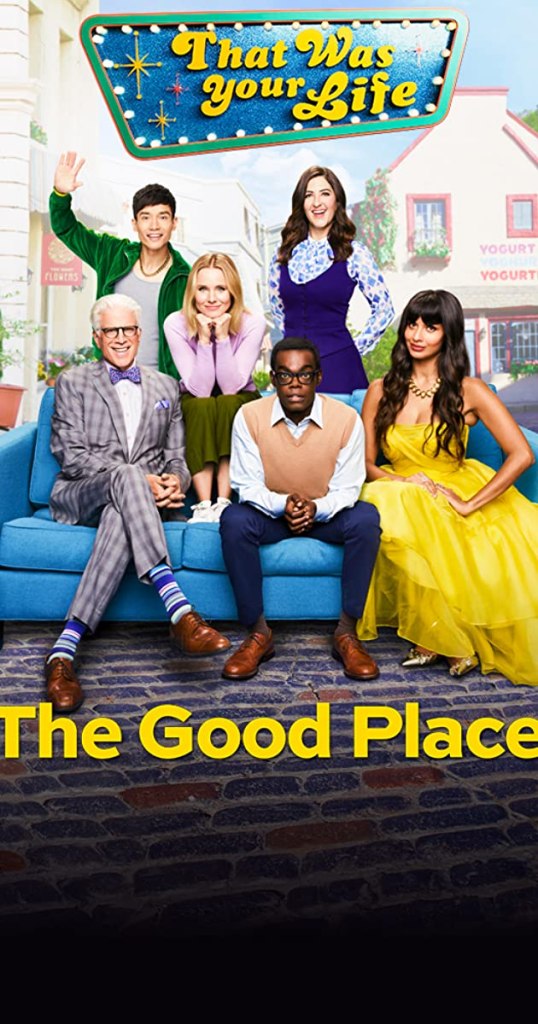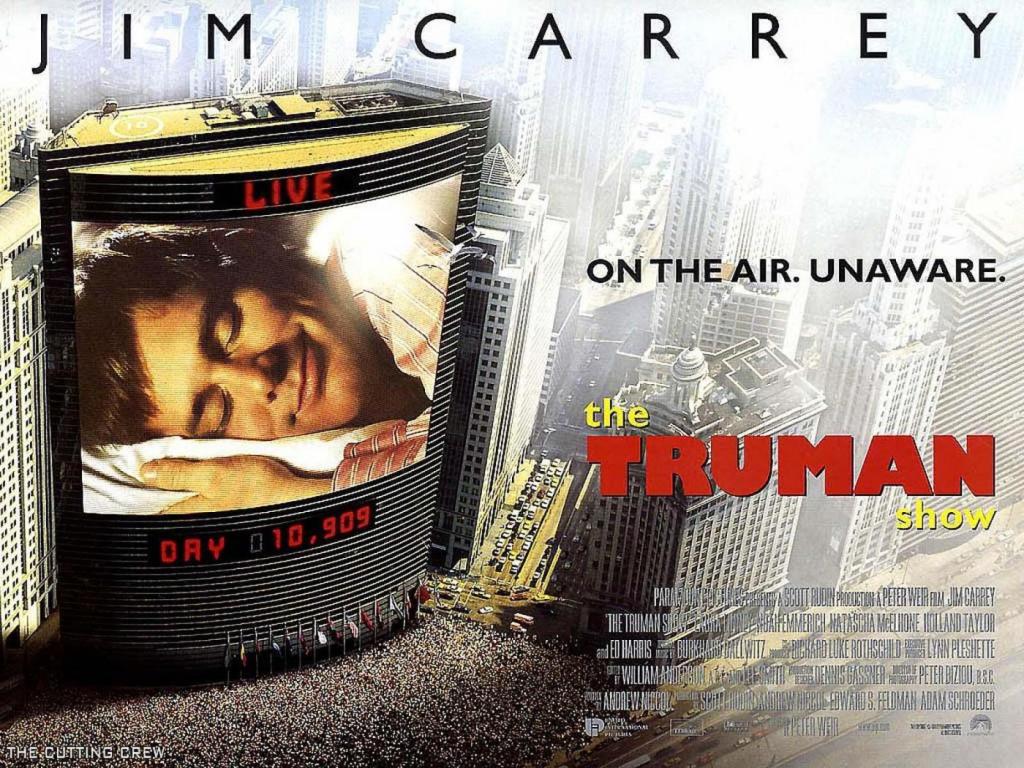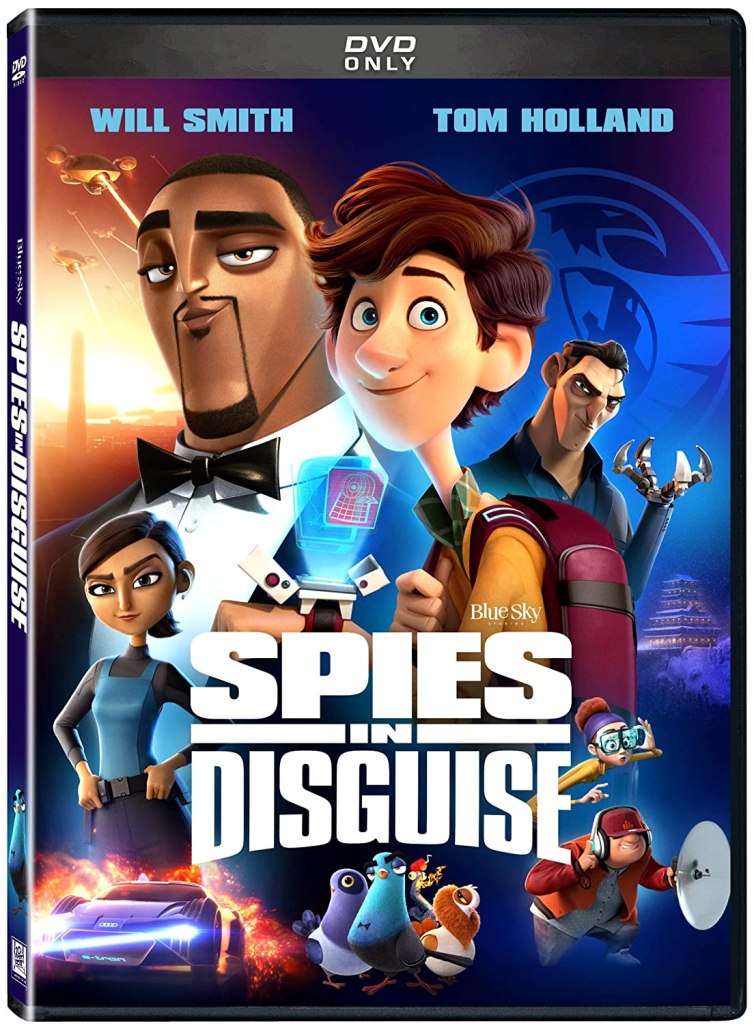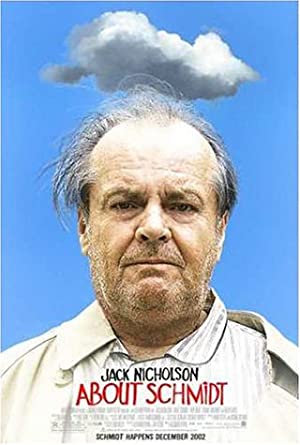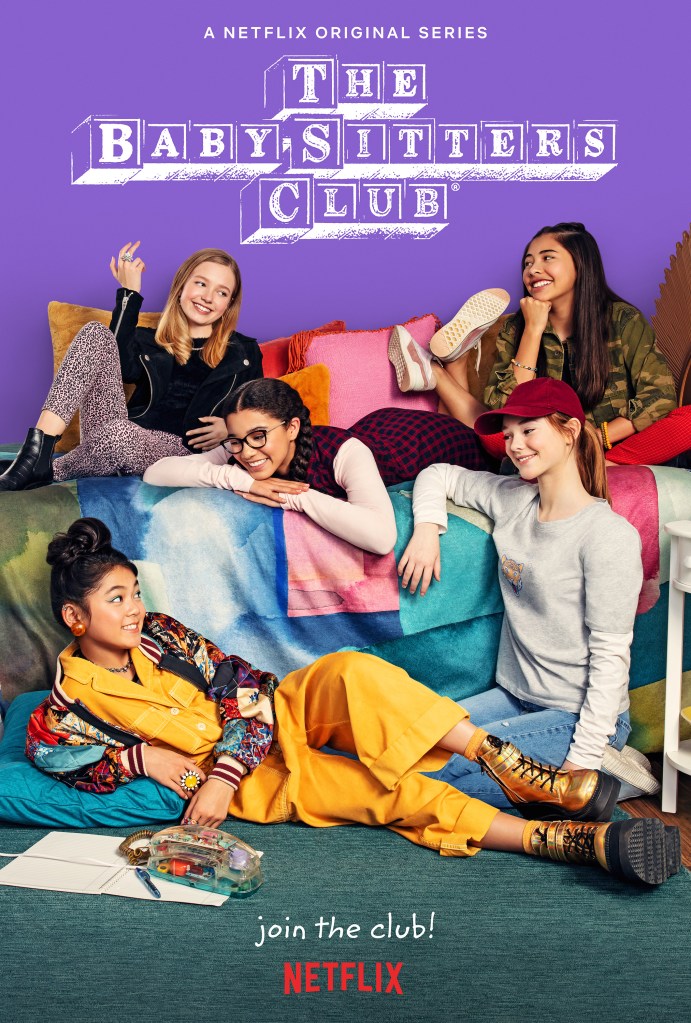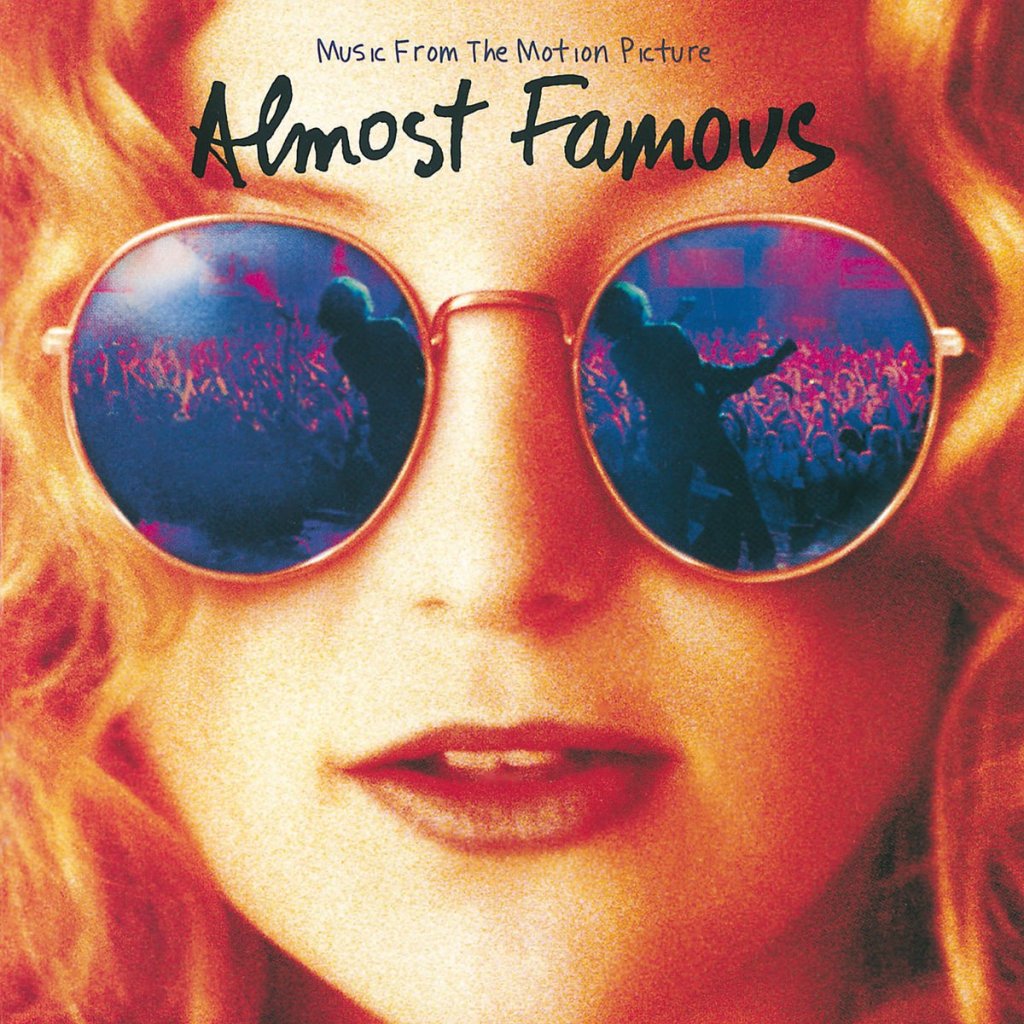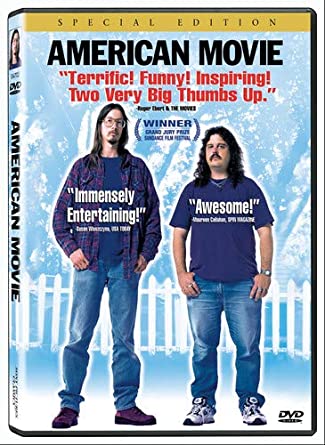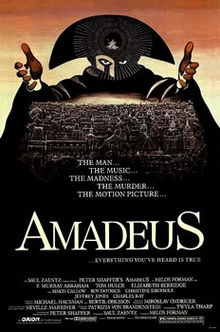THE GOOD PLACE (series, 2016-2020)
When I mentioned to some friends that I was watching this show, I was surprised when they said, “Ehn. It was good, and then it wasn’t. You’ll see.” I was so enjoying it. Quirky. Funny. Full of interesting characters. And just an interesting (if slightly heretical) idea: a young woman dies and is taken to “The Good Place,” one of many heaven-like neighborhoods that has been especially orchestrated to fit the few dozen reeeeally good people who made it there, including each one of their soul mates. But it takes only minutes for Eleanor (Kristen Bell) to realize she doesn’t belong there and only a day to notice that her presence is causing mayhem. Can she—with the help of her supposed soul mate—become a better person and fit in to heaven enough to go undetected and avoid the flames of the Bad Place? Then the first season ends with a twist and the second season becomes a remake of Groundhog’s Day. I am not a fan of Groundhog’s Day and I was not a fan of the pace of that second season. I petered off. I have not yet gone back, though I may, because I would like a return of the innovative show of the first season. We’ll see what happens. The reviews are actually amazing and I should probably finish the four seasons, sometime soon.
THE TRUMAN SHOW (1998)
For the new year, I decided to buy myself a DVD player for my bedroom and watch the DVDs in my collection, beginning with A. Before the player arrived, my kids pulled The Truman Show from the collection and we watched that together, in the family room. We had all watched it before. It was a good movie before and it’s still a good movie, one that encourages discussion during and afterward and is also fun to watch. I mean, I know what’s going to happen at this point, but a new viewer would be kept on the edge of their seat, making all sorts of discoveries. The idea is even good: Truman (Jim Carrey in one of his more serious roles) is born into a reality TV show which the whole world has watched for decades. But can he be kept in the dark forever? And what is the moral cost? And to make things more interesting, Truman has some old things that haunt him—the death of his father and an old flame—that we know more about than he does. It’s a nail-biter. It’s quirky and stimulating and well-put-together.
(500) DAYS OF SUMMER (2009)
I bought myself a DVD player after Christmas, so that I can watch my collected movies in my bedroom, if I so want to. In celebration, I am going to move through what I already own. They sit on the shelf alphabetically, so I began with 500 Days of Summer (numbers come before alphabet) and immediately noticed something that I knew was going to be a pattern: I appreciate the quirky, the unique and artsy. I really enjoy it when a director (or writer) veers off the beaten path just enough to capture my attention and imagination. 500 Days of Summer is one of these movies, for me. Sure, it’s just a romance, and sure, it is supposed to be a little turned on its head based of its outcome/plot (I’ll try not to spoil it, though the dedication at the beginning will give you a hint), but it’s something else that I am referring to. It’s the little things. The way two scenes are sometimes spliced together, the way time jumps back and forth with a ticker of 500 days, the way scenes are replaying and re-cut to show you something you missed before. There are quirks I find annoying, actually, like the kid sister/sage thing. She’s like fourteen, and I’m not buying it. Also, the ending, if you’re not on your toes, can be disconcerting the first time you watch it. But overall it’s a movie that I love and will watch again, largely because of the film-making.
SPIES IN DISGUISE (2019)
Honestly, I didn’t want to watch an animated movie about a spy who turns into a pigeon. I don’t usually like spy movies and I don’t like pigeons. However, this was the one title we could all agree to in a family night perusal of our streaming services, so on it went while we munched our pizza, pasta, and salad. It was quite a bit better than I feared. It was really okay. It’s reassuringly predictable, visually pleasing, and fine for family viewing. And there’s not much more I have to say about that. Fine family movie for a one-time watch.
ABOUT A BOY (2002)
Another anti-romance with quirk factor and artistic direction. See some themes emerging? This one is less blatantly artistic that 500 Days of Summer, but still. And it’s British, which is yet another pattern you will see emerging in my movie collection (and book and music collection, etc.). It’s funny—sometimes I look at the DVD spines on the shelf and I recall the synopsis and I think, ehn. But soon after popping them in, I remember that my liking these movies is not frequently about the context as much as the execution. Again, it’s the little things. And for this one, I was laughing out loud, partly because I am too old to freak out emotionally about the trials and travails of high school, though this kid has some very serious trials. I mean, the teen is so subtle, it’s comic gold. But it’s also very sweet and meaningful and sad and all that. More than just “about a boy,” this movie is about—as stated in Hugh Grant’s introductory monologue—men are islands, or perhaps maybe not islands. It’s about how the most unlikely of characters insinuates himself into Grant’s character’s selfish, kind of boring-but-also-pleasant life and underscores what his sister’s been telling him for years: he is missing out, he is broken. And it’s for a reason he would scarce believe: someone needs him. All the British stuff that happens in between—vegetarians, new trainers, single parent support meetings, rap music, and terrible singing—rise up to support this perhaps tired concept and make it a special movie that shines in the gloom.
ABOUT SCHMIDT (2002)
For years after being exposed to this movie, Kevin and I would sometimes used the phrase, “Dear Ndugu,” to refer to it. It’s one of many movies in my collection that has disappeared from the public eye but that has some things to recommend it, to make it special. Here, instead of quirk, we have a slow and painful satire about the mediocre. And really, it is slow and painful with a glaring spotlight on the mediocre. Still, there a lot of special touches that make this movie stand out from the rest. The acting. The details in both writing and cinematography (for such mundane topics and vistas, especially). You’re watching a train wreck, but you can’t look away, and Jack Nicholson’s correspondence with his sponsor child just throws a rope to lasso the whole mess together. More serious (even depressing) than most of my favorite picks, it’s a movie that will always have a place on my shelf.
ADVENTURES IN BABYSITTING (1987)
So, the next movie in the ABC’s was Adventures in Babysitting. I don’t think this is actually my movie. Did Kevin buy it from a bargain bin? Did someone gift it to us? I actually had never seen it, so I put it in the player and watched. Not gonna’ be a favorite, but I can see why it’s an 80s classic. It has all the elements that were popular at the time, so if you watched it then, it probably has a place in your heart (like me and The Goonies or The Breakfast Club). In fact, if you are in to those types of movies (with the hair and the clothes and the music and the high school romance and the obnoxious character and the cute kids and, in this case, babysitting and the city and organized crime), then this must go on your to-watch list. Standard done exactly as it should be.
THE BABY-SITTERES CLUB (Netflix series, 2020)
My family was not going to join me for most of my viewing-through-my-collection. Also, our family movie nights have been much abbreviated lately by homework. Kevin made the decision that we would start a TV series, and I was pleased as punch when the kids agreed to The Babysitters Club, on trial. I am aware that The Babysitters Club is not high art. I looooooved the series as a kid. It was my first reading love, really, and I devoured the series as each new book came out (up to maybe 40 books at the time). I have enjoyed the Raina Telgemeier graphic novels of the first three books, and now there is a series! Three weeks (and three to five episodes in) and I am giddy whenever we turn it on. It’s so basic, and while I am just so happy to be back in Stoneybrook surrounded by my familiar friends (though it is updated to be current times), I have been surprised that my family is also enjoying it. I don’t know what’s exactly to love about this series, but it is good, clean fun. (Note: As we continue to watch this series, I am reminded why it’s dangerous to review a book or movie not yet finished: things change. Still mid-series, but some of the acting has devolved and, more importantly, the series took a swing toward the hard-left, shoe-horning in every socially progressive idea it could come up with, including issues of gender identity, sexuality-awakening, New Age religion, etc. If you are dishing out more conservative or even moderate morals at home, this is going to get uncomfortable and you’re not going to want to plop your kids down in front of it, for sure.)
ALMOST FAMOUS (2000)
Still on the A’s. I haven’t watched Almost Famous is a very long time. I couldn’t even remember what I loved so much about it that I own a copy, though I could remember liking it. And watching it again, it’s sort of a borderline case, for me. For one, it doesn’t exactly stand out from the pack of movies, except that it is very well executed. I mean, it’s based on Cameron Crowe’s actual story, but we’ve seen this scene before: a kid gets a job writing for a big rock magazine and goes on tour and there’s all sorts of depravity and backstage conflict and back home, a family that highly disapproves of the scene. Well, maybe we’ve seen it before because Almost Famous started the surge of movies like this (many of them biopics based on real musicians and bands)? Recently, I enjoyed How To Build a Girl and loved Rocketman, more of the back-scenes of drugs, sex, and rock’n’roll and how the initiate can survive and be true to themselves amidst the pomp and flash. But both those movies had things to distinguish them from the pack (though magic realism in movies is increasingly done and—dare I say it?—might become overdone soon). Almost Famous is more of just a well-made classic, full of characters and moments that we’ll remember for a long time. (It is well acted for a sort-of light-hearted movie, except for (hate to say it) Jason Lee.) It has great reviews everywhere one looks, so if you haven’t seen it, you should.
AMELIE (2001)
If you don’t do subtitles, move on. If you don’t understand French culture to some extent, move on. But if you’ll watch subtitles and even mildly tolerate French culture (and are old and amenable enough to handle some rather gratuitous and yet abbreviated sex stuff), then this is a great movie and you should see it. It made a splash in 2001, when I first saw it and decided it was a favorite. Audrey Tatou exploded into the American imagination, so adorable and feisty and quirky and broken and not broken. And this film? While having some of the flavor of classic French cinema, it was also toned down into a world-wide universality. But it piled on the little things: Amelie addressing the camera amidst a saturated background and a strange cast of characters, Amelie alone in her apartment and yet surrounded by the other tenants, her co-workers, her distant father. We start the romance with her birth and, without having to become fantasy, the movie is full of magic, and observation after life-observation. We can almost feel, taste, and smell this movie as it unfolds: it sits so close on our eye that it almost chaffs. But we’re always cheering for Amelie, even if she isn’t perfect. And, when we’re done, we want to go out and embrace life the way she does, walk through her neighborhood, and get our hair cut like hers.
AMERICAN MOVIE (1999)
I pretty much forgot this movie existed. To be fair, it’s probably actually my husband’s movie. A 1999 documentary about a guy who spends three years finishing up his (underfunded, backyard) independent horror film, this is the true-life version of an About Schmidt and once again we feel the pain of mediocrity. It also feels a bit like Tonya, except while Tonya was able to crash out of her town onto the world stage, this guy was having a much harder time becoming the film-maker he wanted to be. It could have been lack of opportunities. It could have been a deficit in talent and motivation. Likely it was both. And just like the other movies I mentioned, we can’t look away. I was riveted to the screen and felt a little guilty for it. I mean, I know these people, I know this guy, and we’re just staring at the soft underbelly of their lives, marveling, poking, and of course also judging. It’s a great documentary. I don’t know how they found this guy or what possessed them to follow him around for a couple years, but it’s done well, reviewed highly, and, if the subject matter interests you in the least, it’s one to see.
AMADEUS (1984)
For my final movie of the month and, coincidentally, the last A in my collection, I watched an old favorite: Amadeus. Here is my one complaint: this movie was a little ahead of its time, and yet there was a time when every serious movie was three hours. This has made it difficult for me to go back and watch some of the films from this period, even if they are good: Braveheart, Schindler’s List, Titanic, etc. It’s just that the pacing tends to be slower than we’re used to, during a time in cinema when they were stretching things out without applying all the bells and whistles that we use today to get binge-watchers to invest days of their time at a time. That said, Amadeus is still one of my favorite movies. Based on the lives of Wolfgang Amadeus Mozart and Antonio Salieri (his contemporary)—including plenty of speculation and guessing—the story is told from Salieri’s perspective as, committed to an insane asylum after attempting suicide, he claims during a very impenitent confession to have killed Mozart. We then follow the two men’s lives from childhood through Mozart’s early death, in a romp of amazing music, flamboyance of theater, over-the-top outfits, amazing performances, and impeccable tension. It’s funny (but not overtly comedic) and disturbing. Everyone is impossibly flawed. And we get the message: not only is Salieri as insane as Mozart was, but how could such a lousy person be the medium for such pristine talent? A great movie.
